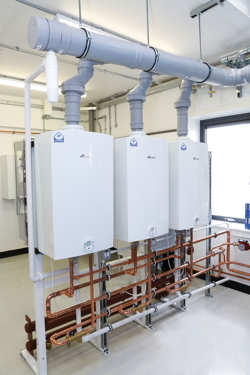Efficient and safe hot water

With hot water usage in hotels and leisure centres often characterised by extremely high peaks followed by longer periods of low demand, Pete Mills of Bosch Commercial & Industrial explains why a continuous flow system can often prove to be the most effective, efficient, and reliable option.
While the amenities offered by hotels and leisure centres can be quite different, the common ground they often share is the manner in which they use hot water. For a hotel, large numbers of guests all wanting a shower first thing in the morning will often be followed by very little need for hot water throughout the day. Similarly, leisure centres may see limited use during the average weekday, before evening fitness classes and swimming lessons create huge demand for showers.
What is important in both of these environments is that such sudden peaks in demand are accounted for during the design of the heating and hot water system. Commercial buildings may have historically relied upon traditional boiler-based systems for their hot-water provision, but these can fail to capitalise on the improved efficiencies, performance, and safety of a more contemporary approach.
Those issues can be addressed by instantaneous water heaters. A continuous-flow system comprising gas-fired instantaneous water heaters is a particularly strong option in both hotels and leisure centres. This type of system offers a way of delivering a varying flow of hot water at a constant temperature to meet fluctuating demand — crucially, without the need for stored water. As an added boost, the system will only ever utilise energy whenever hot water is needed for showers or wash basins, for example.
With no storage vessel needed, cold water enters the heater and activates a flow sensor which ignites the modulating burner immediately. This then heats up the cold water as it passes through the heat exchanger to a set point of 60°C or above.
The option of being able to cluster multiple units together in a cascade arrangement for larger output makes it is possible to achieve flow rates of up to 170 l/min at a 50 K temperature rise to satisfy periods of high demand, but which can then modulate down to the minimum flow rate needed to maintain a secondary circulation system at 60°C. This process of heating the water delivers a constant flow of hot water at the required temperature. Because the ignition process is electronic, there is no need for a standing pilot light, and energy is only consumed to maintain the safe circulation temperature or when hot water is required.
No stored water within the appliance also means the standing energy loss is practically zero, unlike comparable traditional hot-water-storage systems. This in itself is a huge benefit to commercial stakeholders, who are often faced with the challenge of managing heat losses and energy costs.

As is well-known, the primary method used to control the risk from legionella in hot-water systems is water-temperature control. If hot-water systems are maintained consistently above 60°C — as they are in the case of instantaneous systems — there is likely to be minimal risk of legionella growth. However with older traditional storage systems where there is often a slow recovery, and a high hot-water demand, stratification may occur in the storage vessel ,and it is not always possible to guarantee that all the stored water is maintained above 60°C all the time.
In larger storage systems it is also possible for debris to accumulate at the bottom of the storage vessel, which can then harbour legionella bacteria insulated from the high-temperature water within the vessel and posing a potential risk. One significant advantage of a continuous-flow system is that this risk is completely negated.
When it comes to showering, the water which has been heated from cold to 60°C by a water heater will generally need to be blended down to a safe and comfortable temperature of around 40°C. Here, good hygiene regimes and monitoring, as with any hot-water system, form a key part of the protection from legionella.
There are undoubtedly huge potential benefits to be achieved through the implementation of a well-sized system. With the installation of a continuous-flow system, stakeholders can improve their hot-water performance significantly and reduce energy costs, whilst maintaining a strict hygiene regime and reducing the risk of legionella at the same time.
Pete Mills is commercial technical operations manager at Bosch Commercial & Industrial.







